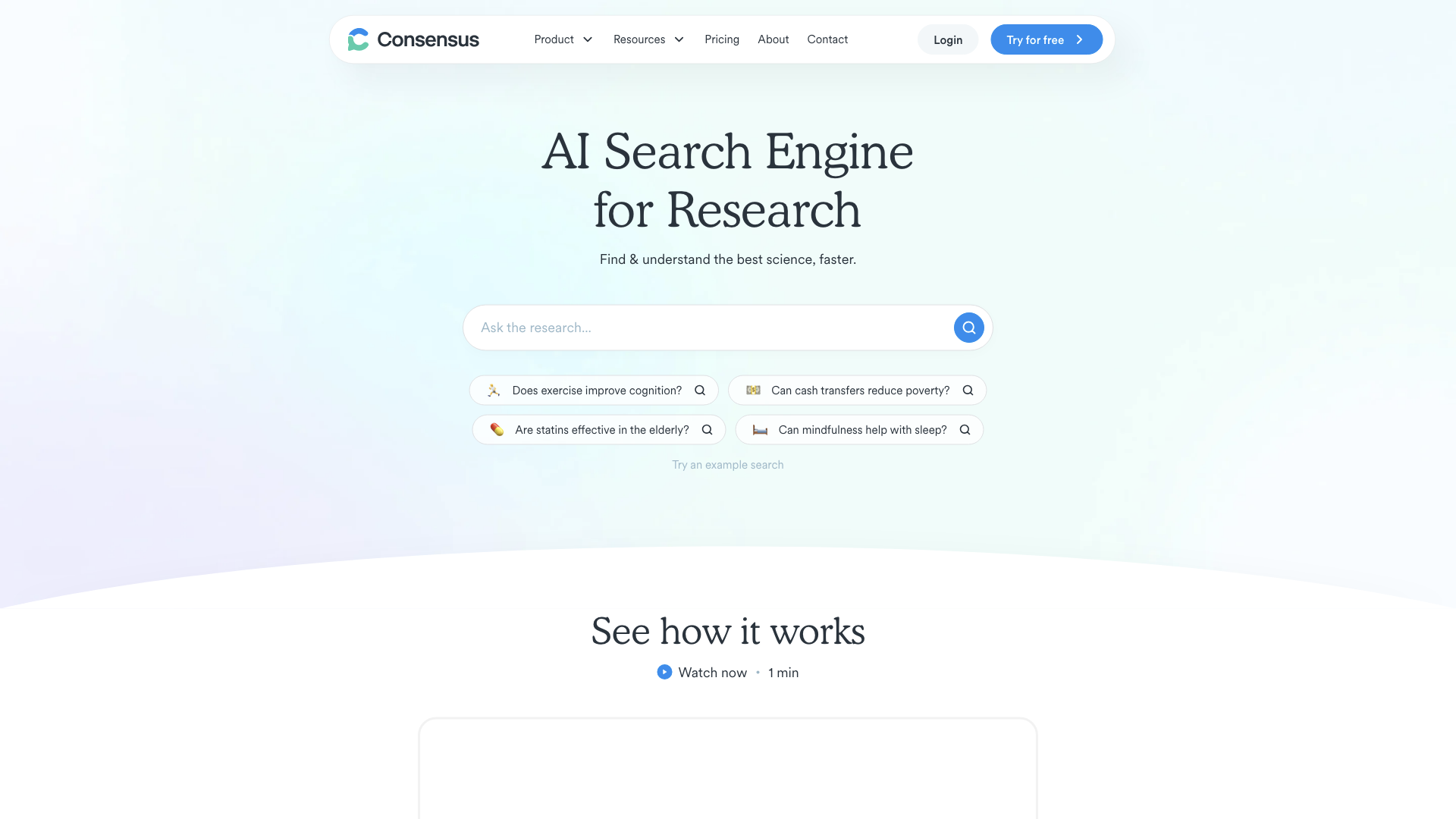What is Consensus?
Consensus is an AI-powered academic search engine designed to help you find and understand the best scientific research faster. It goes beyond simple keyword searches, leveraging advanced AI and machine learning to deliver relevant, insightful results.
Features
-
Extensive Research Coverage: Search through over 200 million research papers across all domains of science and academia.
-
Time-Saving AI Insights: Consensus uses both OpenAI and custom-built LLMs to provide AI-powered summaries, topic context, and direction.
-
Find the Most Relevant Papers: Proprietary academic search tools and filters ensure you find the highest quality research for your specific query.
-
Results Connected to Science: Every source is cited, allowing you to easily access the underlying research paper.
-
Consensus Meter: Quickly gauge the scientific consensus on a topic and understand the direction of current research.
-
Copilot: Ask Copilot to summarize research, draft content, format text, create lists, and more.
-
Paper-Level Insights: Extract key findings and answers directly from research papers, saving you time and effort.
-
Search Filters: Refine your search by sample size, study design, methodology, open access status, and more.
-
Quality Indicators: Focus on the best papers with intuitive labels for citations, journal quality, and study type.
-
Study Snapshot: Quickly see key information like population, sample size, methods, etc., all within the results page.
How to Use Consensus
-
Go to the Consensus website: https://www.consensus.ai/
-
Enter your search query: Be as specific as possible.
-
Explore the results: Consensus will display a list of relevant research papers, along with AI-powered summaries and insights.
-
Filter your results: Use the filters to narrow down your search.
-
Read the papers: Click on a paper to read the full text.
Price
Consensus offers a free tier with limited features. Paid subscriptions unlock advanced features and increased usage limits. Visit the Consensus website for detailed pricing information.
Comments
- "Finally, a search engine that understands science!" - ### Dr. Jane Doe, Research Scientist
- "Consensus is a game-changer for my research workflow. It saves me hours of time." - ### John Smith, PhD Student
- "The AI-powered insights are incredibly helpful. I'm able to grasp complex topics much faster." - ### Sarah Jones, Medical Professional
Helpful Tips
-
Be specific with your search queries. The more specific you are, the more relevant your results will be.
-
Use filters to narrow down your search. Consensus offers a variety of filters to help you find the perfect papers.
-
Read the AI-powered summaries. These summaries can give you a quick overview of the key findings of a paper.
-
Explore related searches. Consensus suggests related searches that can help you expand your research.
Frequently Asked Questions
-
What types of research papers does Consensus index? Consensus indexes a wide range of research papers, including peer-reviewed journal articles, conference proceedings, theses, and dissertations.
-
Is Consensus free to use? Yes, Consensus offers a free tier with limited features. Paid subscriptions unlock advanced features and increased usage limits.
-
How accurate are the AI-powered insights? Consensus uses advanced machine learning models to generate its insights. While these models are highly accurate, it's important to remember that they are still under development. Always double-check the information provided by Consensus with the original research paper.
-
Can I cite the AI-powered insights in my work? No, the AI-powered insights generated by Consensus should not be cited as sources. They are meant to be a helpful tool for understanding the research, but they are not original research themselves.
